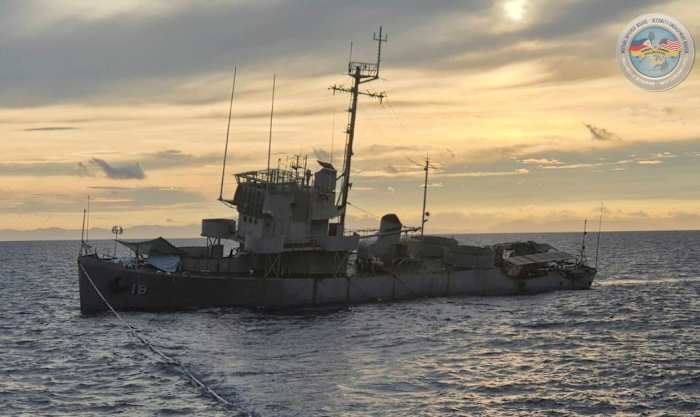Share this @internewscast.com

MANILA – A World War II-era Philippine navy ship intended for use as a target in a combat exercise by American and Philippine forces accidentally sank Monday just hours before the anticipated mock assault, causing the exercise to be called off, U.S. and Philippine military officials reported.
The BRP Miguel Malvar, decommissioned by the Philippine navy in 2021, began taking on water while being towed through rough seas near the disputed South China Sea and eventually sank about 30 nautical miles (55 kilometers) off the western Philippine province of Zambales. The Philippine military confirmed there was no one onboard when the ship began listing and subsequently went under.
Despite the unexpected sinking of the Malvar, American and Philippine forces planned to continue with other live-fire drills off Zambales on Monday. Originally constructed as a patrol vessel for the U.S. Navy in the 1940s, the ship was later transferred to Vietnam’s navy before being acquired by the Philippine military, explained Philippine navy Capt. John Percie Alcos.
“It’s an 80-year-old dilapidated ship and it wasn’t able to withstand the rough seas,” Philippine Lt. Col. John Paul Salgado told The Associated Press.
The ship-sinking exercise was planned in an offshore area facing the hotly disputed Scarborough Shoal, which has been closely guarded by the Chinese coast guard, navy and suspected militia ships.
The Philippines also claims the fishing atoll, which lies about 220 kilometers (137 miles) west of Zambales. Chinese and the Philippine forces have had increasingly hostile confrontations in the waters and airspace of Scarborough in recent years.
The cancelled ship-sinking drill would have been the third to be staged by the treaty allies in recent years. It was supposed to be one of the highlights of largescale annual military exercises by the United States and the Philippines from April 21 to May 9 with about 14,000 U.S. and Filipino forces participants.
Called Balikatan, Tagalog for shoulder-to-shoulder, the combat drills have increasingly focused on the defense of Philippine sovereignty in the face of China’s growing aggression in the South China Sea, which Beijing claims virtually in its entirety.
Mock battle scenes which have been staged so far, including the retaking of an island from hostile forces, have reflected assurances by the Trump administration, including by Defense Secretary Pete Hegseth, that the U.S. would abide by its treaty commitment to defend the Philippines in case Filipino forces come under an armed attack, including in the South China Sea.
On Sunday, U.S., Australian and Philippine forces practiced retaking an island from hostile forces in the coastal town of Balabac in western Palawan province, which faces the South China Sea.
Japanese forces and British marines joined as observers of the combat exercise, which “showcased the growing interoperability and cohesion among partner nations in maintaining regional security,” Salgado said.
“What we have seen since Trump returned to the White House is a remarkable level of continuity in the US-Philippines alliance not only in joint military drills, but also on American statements that the alliance is ‘ironclad,’ said Derek Grossman, a senior defense analyst at RAND Corporation.
“The Trump administration is trying to keep the pressure on China through its support to the Philippines,” Grossman said, but added that it’s unclear “just how sustainable this commitment will be given that the Trump administration seems less hawkish on China than its predecessors.”
China has vehemently opposed such exercises involving U.S. forces in or near the South China Sea or Taiwan, the island democracy, which Beijing claims as a province and has threatened to annex by force if necessary.
U.S. and Philippine military officials, however, have insisted that the combat exercises were not designed with China in mind but serve as a deterrence to acts of aggression in the region.
Copyright 2025 The Associated Press. All rights reserved. This material may not be published, broadcast, rewritten or redistributed without permission.

















